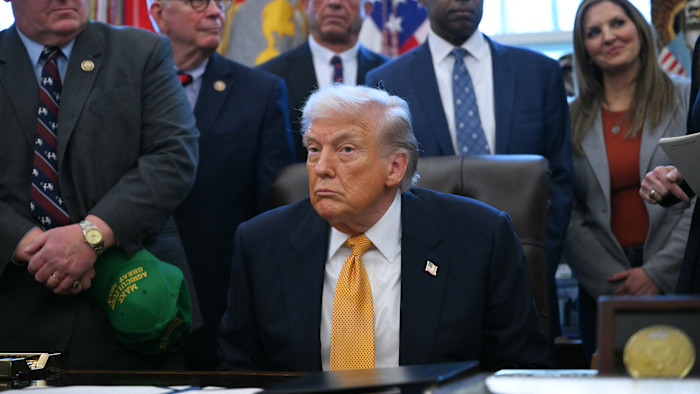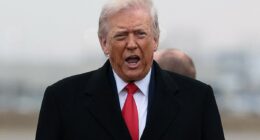Share this @internewscast.com
President Donald Trump announced that he had received assurances indicating a halt in the killing of protesters in Iran. While adopting a more restrained approach towards Tehran, he did not completely dismiss the potential for U.S. military intervention.
His statements came on Wednesday amid reports of the U.S. beginning to evacuate personnel from its largest military base in the region. This move followed heightened concerns about a possible U.S. strike on Iran, which has stirred fears of broader conflict across the Middle East.
“We’ve been informed that the violence in Iran is ceasing, and it has indeed stopped. There are no plans for executions,” Trump stated from the Oval Office, referencing the Iranian regime’s previously reported intentions to execute detained protesters. However, he did not reveal the source of this information.
In response, Iran’s Foreign Minister Abbas Araghchi told Fox News later on Wednesday that he was unaware of any executions. “There are no hangings scheduled for today, tomorrow, or in the foreseeable future,” he assured.
When pressed about the possibility of hangings on Friday, Araghchi expressed confidence, stating, “I am certain there are no plans for any executions.”
Trump’s earlier remarks helped alleviate some market anxieties over an immediate U.S. attack on Iran, leading to a drop in oil prices. By Wednesday afternoon in New York trading, Brent crude, the global oil benchmark, had declined by 4 percent to $63.78 per barrel.
Asked if US military intervention was off the table, he said that “we’re going to watch and see what the process is. But we were given a very good statement by people that are aware of what’s going on.” Trump added that he hoped it was “true” that the executions had been halted.
“That’s a big thing,” he said, adding that he would “find out more” later on Wednesday.
Trump told Reuters in an interview published on Wednesday night that the protests could cause Iran’s regime to fall, although he added that “any regime can fail”.
“Whether or not it falls or not, it’s going to be an interesting period of time.”
He downplayed the potential role of Reza Pahlavi, the exiled son of the former Iranian shah who has positioned himself as a leader for opponents of the regime in Tehran.
Trump said he was not sure that Pahlavi could gain the necessary support in Iran to lead the nation should the regime collapse. “I don’t know whether or not his country would accept his leadership, and certainly if they would, that would be fine with me.”
The president’s remarks came amid growing concerns that instability in Iran could spill into neighbouring countries if he follows through on his pledges to intervene in support of the anti-regime demonstrations that have swept the Islamic republic since December.
A US official on Wednesday said “some people” were leaving Al Udeid air base in Qatar, Washington’s regional military command centre that hosts about 10,000 troops. The state department also advised personnel at the US embassy in Doha and other American citizens in Qatar to “exercise increased caution and limit non-essential travel to Al Udeid Airbase”.
Tehran previously targeted Al Udeid with a missile barrage after the US bombed its nuclear facilities during Israel’s 12-day war against Iran in June. The UK also evacuated some personnel from the base and temporarily closed its embassy in Tehran.
Iran’s neighbours have stepped up mediation efforts in recent days and Iranian officials have held talks with countries including Qatar, the United Arab Emirates and Turkey, all of which host significant American military bases.
A Gulf official said the US was also moving air force assets out of the region in an apparent effort “to avoid being within range” if Iran was to retaliate in the event of an American strike.
US Central Command, which oversees military operations in the Middle East, declined to comment.
Human rights groups estimate thousands have been killed in the demonstrations in Iran, which have escalated into the most severe anti-regime unrest since the Islamic revolution in 1979.
Trump on Tuesday appeared to suggest US action in the country was imminent, posting on his Truth Social platform that “HELP IS ON ITS WAY”. He added he had scrapped all meetings with Iranian officials until the “senseless killing of protesters” ended and would “take very strong action” if the regime executed people detained during the unrest.
An Iranian official said Tehran was monitoring developments at Al Udeid and was ready to take “retaliatory measures”. He added diplomacy by Qatar or any other country was meaningless under the circumstances, claiming the US “is not serious” about negotiations.
The Iranian official urged regional states “not to allow their territory to be used for aggression by one country against another”.
The US has fewer military assets in the region since it struck Iran’s nuclear sites in June, with fewer than 40,000 troops spread across bases and ships.
Washington also does not have an aircraft carrier nearby after sending the Gerald R Ford carrier strike group from the Mediterranean to the Caribbean late last year. But it does have six warships in the region, including three guided-missile destroyers, two in the Gulf and one in the Red Sea.
Gulf officials have insisted they would refuse any US request for their territory to be used in a strike against Iran.
Saudi Arabia and its Gulf neighbours prefer a weakened Iran, despite a détente with the Islamic republic in recent years, but they remain concerned about the destabilising impact of American intervention.
Regional officials fear any action by Washington targeting the regime, rather than its nuclear facilities, as during last June’s strikes, could spark a severe Iranian response.
Additional reporting by Simeon Kerr and Najmeh Bozorgmehr











